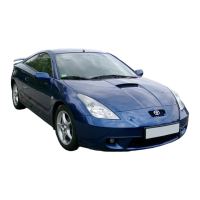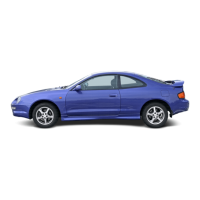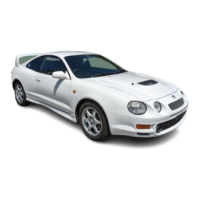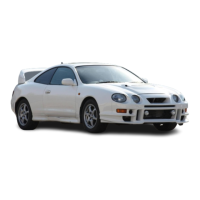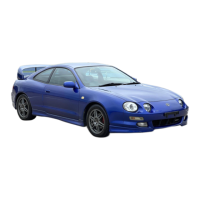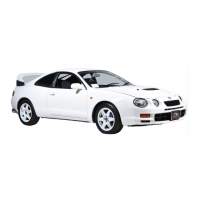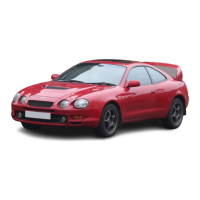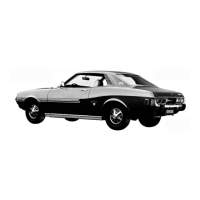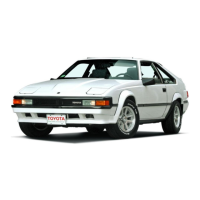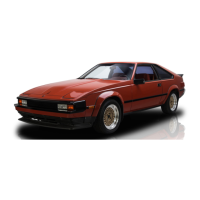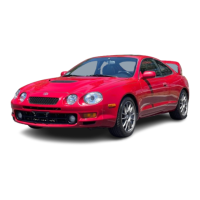
Do you have a question about the Toyota Celica 1997 and is the answer not in the manual?
| Brand | Toyota |
|---|---|
| Model | Celica 1997 |
| Category | Automobile |
| Language | English |
Provides an overview of the vehicle's instruments and controls.
Details the various components of the instrument panel.
Explains the gauges and indicators in the instrument cluster.
Explains the meaning of various warning lights and indicator symbols.
Details the types of keys and their functions.
Explains how to lock and unlock the side doors.
Covers the operation and precautions for power windows.
Details how to open and close the trunk lid or back door.
Explains how to open and secure the vehicle's hood.
Provides instructions for opening and closing the fuel tank cap.
Explains the operation of the electric moon roof.
Covers operation and precautions for the convertible top.
Instructions on how to adjust and use head restraints for safety.
Provides essential information and precautions for using seat belts.
Details the Supplemental Restraint System (SRS) airbags.
Safety precautions and guidelines for using child restraint systems.
Information on types of child restraint systems and their installation.
Classifies child restraint systems based on child's age and size.
Instructions on operating headlights and turn signals.
Details on how to activate and use emergency flashers.
Explains how to adjust the brightness of instrument panel lights.
Instructions for turning on and using front fog lights.
Explains the fuel gauge and low fuel level warning.
Details the engine coolant temperature gauge and overheating.
Explains the tachometer and its use for engine speed.
Describes the odometer and trip meters for tracking distance.
Explains various service reminder indicators and warning buzzers.
How to use the ignition switch and steering lock mechanism.
Operation and features of the automatic transmission.
Details on shift patterns and recommended shifting speeds.
Instructions on setting and releasing the parking brake.
How to operate and use the cruise control system.
Overview of car audio system features and operation.
Explains specific buttons, controls, and features of the audio system.
Details on air conditioning system controls and operation.
Instructions for setting and changing the anti-theft system security code.
Recommendations for optimal heating performance.
Recommendations for optimal air conditioning performance.
Recommendations for optimal ventilation performance.
Instructions for defogging and defrosting the windshield.
Details on how instrument panel vents operate and can be adjusted.
Instructions for setting and operating the digital clock.
How to use the cigarette lighter and ashtray.
Instructions for opening and locking the glovebox.
How to open and close the auxiliary box.
Information on using the cup holder.
Details on how the luggage cover operates.
Guidelines for breaking in a new Toyota vehicle.
Information on fuel types, octane ratings, and tank capacity.
Considerations for driving a Toyota in foreign countries.
Explanation of the three-way catalytic converter and its function.
Important safety precautions regarding engine exhaust.
Explains normal engine oil consumption and its causes.
Details on the brake system, including ABS and booster.
How to identify when brake pads need replacement.
Guidelines for safely stowing luggage and cargo.
Locating and understanding the vehicle identification number (VIN).
Information about theft prevention labels on the vehicle.
Precautions regarding modifications to the suspension and chassis.
Information on different types of tires and their characteristics.
Pre-driving checks and procedures before starting the engine.
Step-by-step guide on how to start the vehicle's engine.
Advice for driving safely in different conditions.
Specific tips for driving safely in winter conditions.
Guidelines and precautions for towing a trailer.
Tips for improving fuel economy and vehicle longevity.
Troubleshooting steps when the vehicle fails to start.
What to do if the engine stalls while driving.
Procedure to follow if the vehicle's engine overheats.
Instructions for changing a flat tire.
Guidelines and precautions for towing the vehicle.
Troubleshooting steps for an inoperable shift selector lever.
Manual operation procedures for the convertible top.
What to do if you lose your vehicle keys.
Methods and guidelines to prevent corrosion on the vehicle.
Instructions for washing and waxing the vehicle for appearance care.
Procedures for cleaning the vehicle's interior.
Overview of required maintenance and its importance.
Routine checks and basic maintenance tasks for the vehicle.
Clues and indicators that suggest a vehicle may need repair.
Overview of do-it-yourself maintenance procedures and precautions.
Diagrams and labels for major components in the engine compartment.
Diagrams showing the locations of fuse boxes.
Safety precautions to follow when performing DIY maintenance.
List of necessary parts and tools for DIY maintenance tasks.
Procedure for checking and adding engine oil.
How to check and maintain engine coolant levels.
Instructions for checking and maintaining brake fluid levels.
Procedure for checking power steering fluid levels.
How to check and maintain proper tire pressure.
Guidance on checking tire tread and replacing tires.
Information on the importance and procedure for tire rotation.
Instructions on installing snow tires and tire chains.
When and how to replace vehicle wheels.
Specific precautions for maintaining aluminum wheels.
How to check battery condition using fluid levels or hydrometer.
Precautions to follow when recharging the vehicle battery.
Steps for checking and replacing blown fuses.
Instructions for adding washer fluid to the tank.
Procedure for checking and adjusting headlight aim.
Illustrations and guidance on replacing various light bulbs.
Specifications for vehicle dimensions and weight by model.
Technical specifications for the vehicle's engine.
Fuel type, octane rating, and tank capacity specifications.
Key engine service specifications, including valve clearance and spark plugs.
Tire size, pressure, wheel size, and torque specifications.
Listings of fuse types, ratings, and their corresponding circuits.
Information on reporting vehicle defects to NHTSA and Toyota.
Explanation of DOT quality grades for tires (Treadwear, Traction, Temperature).
